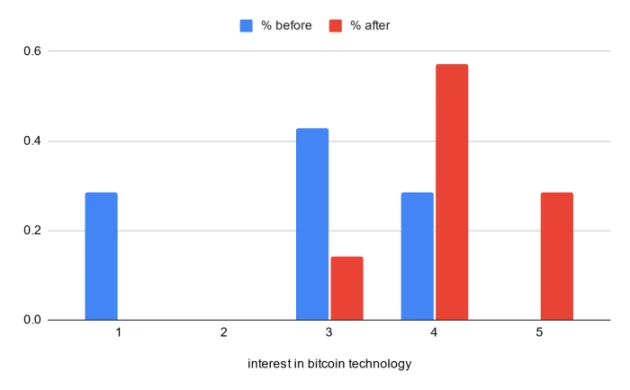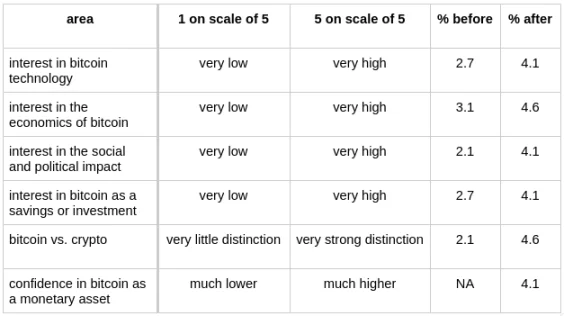Author: Stan Reeves
Translator: Luffy
I received a simple but unexpected message from a student: "Are you conducting any form of independent research on cryptocurrencies or related fields?" I have no intention of teaching cryptocurrency-related courses, but I have considered offering a course on Bitcoin.
As a university engineering educator and Bitcoin enthusiast, I am acutely aware of the importance of Bitcoin education in fully realizing its potential. The intrinsic properties of Bitcoin make it a solid foundation for a new monetary system. However, before it can challenge the status quo, its emerging features must be widely accepted, and acceptance will only increase with the spread of education. Bitcoin is still new, unfamiliar, and confusing to most people. We need to find curious individuals who are willing to make the effort to understand it and then pass on their understanding and confidence to those around them.
When considering the student's request and the importance of Bitcoin education, I wondered if I should offer a course on Bitcoin. What better way to popularize Bitcoin than to engage people as an audience for the entire semester, involving them in tuition and grades? I conducted some exploratory discussions with other students and received a positive response.
Overview of the Bitcoin Course
I began looking for course models and made an amazing discovery in the process. Although a large number of courses at major universities involve Bitcoin, most of them do not focus on Bitcoin. These courses are usually referred to as "Bitcoin and Cryptocurrencies," treating Bitcoin as just another cryptocurrency. "Bitcoin and Blockchain" courses abstract blockchain from Bitcoin and consider it the truly important innovation.
Other courses, such as the one developed by Korok Ray at Texas A&M University, delve into the technical aspects of Bitcoin and require programming as an important component of learning. This approach is valuable for students with a technical mindset but may not appeal to those without coding motivation. (Professor Ray is now offering a more general course for business students.)
I found a few courses that are not primarily focused on technology but on Bitcoin, such as:
- "Philosophy and Economics of Bitcoin," taught by Andrew Bailey, Associate Professor of Philosophy at Yale-NUS College
- "Bitcoin and the Future of Money," taught by Craig Warmke, Associate Professor of Philosophy at Northern Illinois University
- "Bitcoin and Digital Assets," taught by Nik Bhatia, Adjunct Professor of Finance and Business Economics at the University of Southern California
It is clear that universities are in great need of general courses specifically focused on Bitcoin.
Course Philosophy
I chose to offer a non-technical course specifically focused on Bitcoin. I called it "Exploring Bitcoin." I discussed other cryptocurrency projects but to distinguish Bitcoin from other cryptocurrencies. I want students to understand that Bitcoin is an innovation with the potential to change the world. While certain crypto projects may have value beyond currency, they should not be equated with Bitcoin or receive equal attention. I believe that a layered approach to building functionality on Bitcoin has engineering significance, and the efforts of Lightning, Rootstock, and Liquid are excellent examples. Trying to build a protocol that does everything at once is not good engineering practice.
My course covers easily understandable technical and engineering details, but it also focuses on the economic, financial, and social aspects of Bitcoin. I intentionally designed the course so that students from any major could learn it from scratch. I want the audience to be as broad as possible because Bitcoin is suitable for everyone.
This decision met with some resistance. Students are generally curious about cryptocurrencies but also accept my view of the priority of Bitcoin. Others question how the focus on Bitcoin reflects academic value such as research, analysis, and experimentation. My response is that Bitcoin is the earliest cryptocurrency, an absolutely scarce root. It solves the fundamental problems of currency, its market value equals the sum of all other crypto assets, and its network effect surpasses other assets. Delving deeply into the most important thing is more meaningful than superficially covering a thousand less important things.
Learning Experience
I believe this approach is right and maintains the challenge of engaging students' thinking, advocating time-tested design principles, and focusing on the academic value of fundamental issues. One student said after the course, "Before this course, I thought I knew enough about Bitcoin, but this course made me humble and changed some of my views. Most importantly, this course helped me understand why Bitcoin should be separated from other cryptocurrencies, which is the message I plan to convey when introducing Bitcoin to others."
Because my goal is to accommodate a variety of students and interests, I asked each of them to design and execute a significant, semester-long individual project. The project could involve hardware, software, case studies, or papers. By allowing them to flexibly choose topics with my approval, the course accommodated their personal interests, strengths, and career directions. The topics ranged from research on Bitcoin education challenges to hardware implementation of simple mining devices.
The final assignment required students to use all the knowledge they learned in the course to create an informative and persuasive presentation about Bitcoin. They had to fully explain why everyone should (or should not) care about Bitcoin and present it to at least three people. (I am pleased to say that all students chose to do presentations in support of Bitcoin.) The students' approaches were very creative. One student asked all the audience members to take out their phones, open an exchange account, and buy $10 worth of Bitcoin. He guided them through the entire process, and they all received a little Bitcoin. Now they are involved and have a reason to learn more about Bitcoin.
Some students were frustrated to find that some of their audience members were staunchly opposed to Bitcoin (usually "cryptocurrencies"), and their persuasive attempts hardly changed the opponents' views. Bitcoin education is challenging! I hope this experience will be the beginning of learning and efforts to educate others about Bitcoin. At the end of the semester, over 70% of the students said they planned to find ways to introduce Bitcoin to others.
Student Reactions
Overall, I believe this course is very effective in educating students about Bitcoin and helping them continue to advance Bitcoin in their own decision-making and conversations with others. From the data, nearly half of the students enrolled not because they were interested in Bitcoin, but because "this is the only relevant course." Only just over a quarter of the students had previously dabbled in cryptocurrencies. The distribution of interest in Bitcoin technology changes as shown in the following figure.

Feedback from students in other fields also sheds light on the issue, as shown in the table below.

Students engaged with various aspects of the Bitcoin topics we covered. They were fairly neutral at the outset about each topic area I investigated, but their interest in each topic ranged from high to very high. They raised sharp questions and found some of their own answers online.
Student feedback indicates that they want to practice as early as possible. One student said, "My usual way of dealing with problems is to find a viable solution, then research it and figure out how it works." Although I asked students to engage in Bitcoin and Lightning Network transactions, I did not do so early. In the future, I will introduce this requirement early on, and may even provide them with some small Bitcoin rewards. This will provide them with a practical background for more subsequent discussions, especially on security, blockchain, mining, and scaling. They will immediately have some Bitcoin to motivate their learning. It will establish a culture of their own research for the course, which is crucial for Bitcoin enthusiasts.
Key Points
This course confirms the great potential for Bitcoin education in a university setting. It emphasizes a more general strategy that Bitcoin enthusiasts should adopt: using existing channels to spread Bitcoin. One of my students did a project on the challenges of Bitcoin education, and this principle was one of his main takeaways. We do not need to develop entirely new channels for Bitcoin education; many avenues already exist. For example, community colleges often look for interesting topics to serve the community in the form of short courses. Some communities and universities have special programs for retirees, including guest lectures and hot topics. High schools that teach economics courses may sometimes welcome guest lectures on topics such as Bitcoin. There are many quality resources available for this work, such as my first Bitcoin course. Use your imagination, and you will find many such opportunities.
To develop Bitcoin education in a university environment, some challenges must be overcome. First, more university professors need to embrace Bitcoin and recognize the necessity of Bitcoin education. Those who can listen to the course should strive to make them understand the transformative nature of Bitcoin. Advocating Bitcoin in an academically rigorous manner is very important. But a little-known secret is that professors are also people and are sometimes influenced through daily conversations with non-scholars.
Second, Bitcoin is a highly interdisciplinary subject, and professors from multiple disciplines need to embrace the opportunity to teach Bitcoin. The topic of Bitcoin as a class may encounter resistance in some ideologically controversial departments, such as philosophy or economics. In my field (engineering), the greater challenge is convincing non-engineering students to enroll in courses listed as engineering. This may require engineering professors to improve our marketing skills.
Third, due to the interdisciplinary nature of Bitcoin courses, they may provoke some academic territorial disputes. A strong argument needs to be made that Bitcoin does not entirely fit into a particular department or university. As long as certain aspects of the course require the department's expertise, the professor who created the course can teach it in that department.
Final Thoughts
Introducing a Bitcoin course during a bear market may seem foolish. But establishing university courses before the next bull market creates a surge of interest in Bitcoin education, and now is the time to work towards that goal.
We are at the forefront of a monetary revolution, but it requires education. Bitcoin education in universities not only provides a way to educate students about Bitcoin. It also provides a way for these students to become educators of the next generation of Bitcoin adopters. University students are often curious, energetic, and influential, and it is these types of people who can effectively introduce Bitcoin to others. As education about Bitcoin continues to develop, trust will also strengthen. This will open the door for widespread Bitcoin adoption that we are passionate about.
免责声明:本文章仅代表作者个人观点,不代表本平台的立场和观点。本文章仅供信息分享,不构成对任何人的任何投资建议。用户与作者之间的任何争议,与本平台无关。如网页中刊载的文章或图片涉及侵权,请提供相关的权利证明和身份证明发送邮件到support@aicoin.com,本平台相关工作人员将会进行核查。




